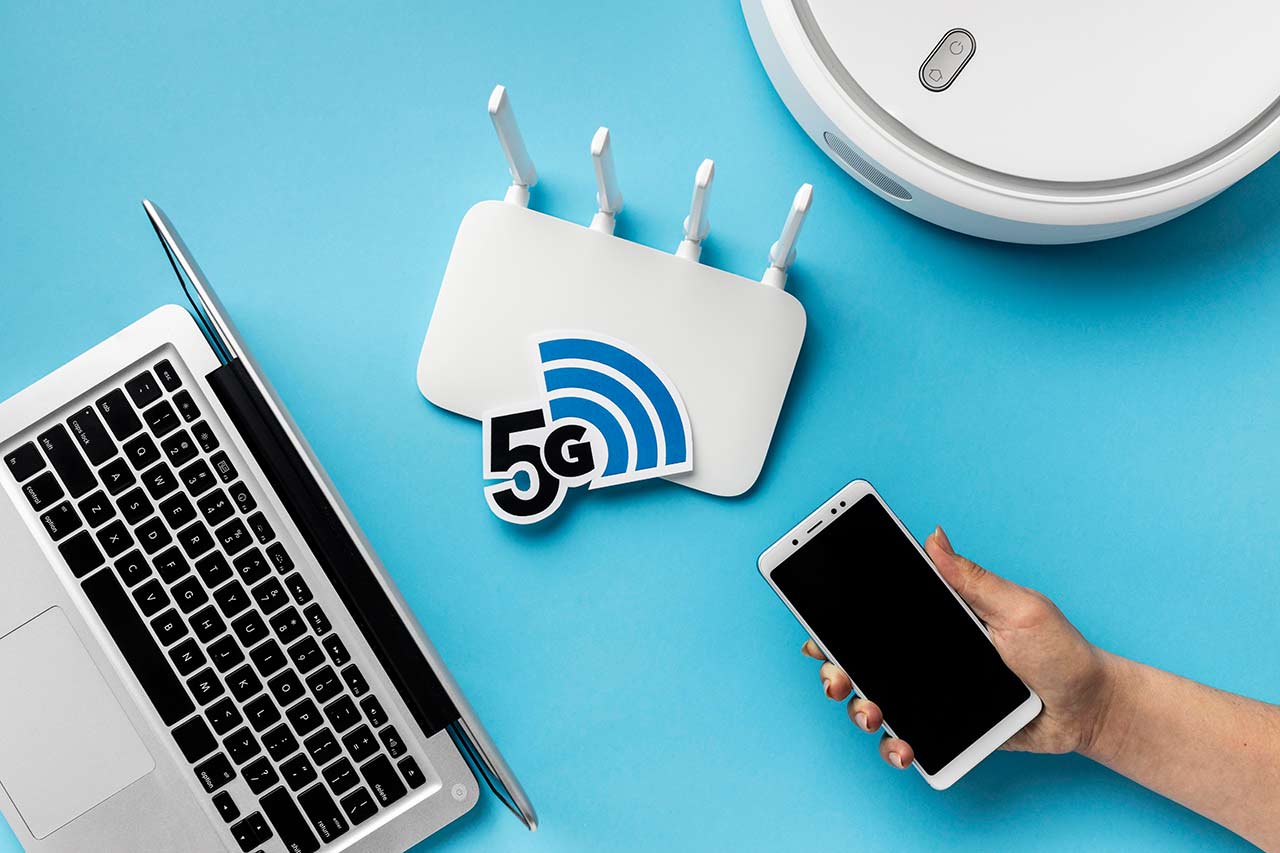5G technology breaks into the world and is set to revolutionize the way we communicate and use our devices inside and outside the home. However, many doubts remain about what 5G technology is, what it is for and what advantages it offers to citizens. In this article we explain everything you need to know about 5G.
What Is 5G?
5G is the shortened acronym used to refer to the fifth generation mobile network. The 5G is the successor of 4G technology and represents a real change in the standards of wireless communication using our mobile phones, computers and even a growing number of appliances (refrigerators, ovens, televisions …).
The great revolution of 5G lies in that it improves all the necessary parameters in wireless communication: bandwidth, latency and even capacity or number of devices connected at the same time. With 5G it is possible to transmit data at a speed of more than 100 MB per second (reaching up to 1 GB per second) and the latency is very low (1 millisecond, below 30 milliseconds with 4G).
5G allows mass communications between different devices, which opens a whole new world in the use of the Internet of Things (IoI), with more than 100 different devices connected at the same time in the same network.
Advantages Of 5G
5G has a long list of advantages over the 4G technology that has been used until now. Among the main improvements of this technology, the following stand out:
Efficiency: 5G requires less energy consumption than 4G technology (up to 90% less consumption). This is a milestone considering that climate change forces us to reduce energy consumption. Additionally this is something that users will appreciate how much the duration of their batteries improve. However, the generalization of 5G also presents some environmental problems, mainly due to the fact that it will exponentially increase data consumption, therefore, increase energy consumption despite being more efficient.
More Connected Devices: 5G technology makes possible the growing number of simultaneously connected devices throughout the planet, since it improves connection speed and has a latency similar to that currently only offered by fiber optic cables in homes and offices. With 5G it is possible to have more than one hundred devices connected in just one square meter, which opens the door to greater use of smart appliances.
A Revolution In Homes And Businesses: Wireless technology was a great change in the way we connect and now 5G is seen as a great revolution in wireless internet. For example, this technology opens up a wide range of opportunities for vehicle manufacturers, who are already beginning to incorporate new features and improvements in connectivity, safety and driving.
Hoaxes About 5G
5G technology has been the subject of great hoaxes that have spread across the planet through the media and social networks. Among all the false information that circulates on the network about 5G, the most worrying is that which refers to the supposed impact of this technology on health: there is no scientific evidence that proves a negative impact of 5G waves on health human. The World Health Organization (WHO) itself has denied it on several occasions.
There is also no evidence on the impact of 5G antennas on people’s physical well-being. In fact, the frequencies used by 4G, the predecessor of 5G, are very similar.
In the wake of the pandemic in recent months, a very widespread hoax about the alleged relationship of 5G with the coronavirus has also gained popularity: it is false that 5G technology is related to the pandemic, despite the conspiracy theories circulating on the networks. It is also not true that the Chinese city of Wuhan was the first to have the deployment of 5G technology, as many preachers and conspirators have claimed through different web portals. This and other similar hoaxes have been denied by the authorities of different countries and even by the Scientific Advisory Committee on Radio Frequencies and Health and the International Union of Communications.
Controversy With Huawei And 5G
It is very likely that you have heard about the limitations that some governments are putting on the 5G technology of the Chinese company Huawei and the installation of its infrastructure in some countries. This controversy gained global visibility when in 2020 the governments of the United States and United Kingdom announced that they will leave Huawei out of the 5G business in their countries and will not allow mobile phone providers to buy new Huawei 5G equipment.
The origin of this problem is, these and other governments fear that the Chinese authorities could use Huawei’s infrastructure to obtain sensitive information, spy on it, and compromise the security of communications (for example, cutting transmissions at a certain time). Huawei denies that such a thing can happen, but authorities in some countries are suspicious.
Most analysts agree that it is not a technological problem but a geopolitical one; controlling an advance as important as 5G and the entire network of devices that make this technology possible can be of vital importance in the political and economic sphere. That’s why governments hesitate taking such abrupt decisions in this regard.
Huawei, the world’s second largest smartphone maker, is excluded from 5G advancements in some countries. As an alternative, United States turn to national companies, including Cisco, Juniper Networks and Qualcomm, while in Europe the favorite providers are the Swedish Ericsson and the Finnish Nokia.
When Does 5G Arrive In My Country?
There are no exact dates to indicate when the 5G network will be fully installed and operational in different countries, but its progressive consolidation in all countries is confirmed. In general, 5G will reach large capitals earlier than the small towns and will largely depend on the decisions of each telecommunication company.
In Spain, 5G technology is expected to reach massive capacity in the first months of 2021, while in various parts of the United States, 5G network has been widely implemented since August 2020.
In Latin America, everything points to Mexico as pioneering country in 5G technology, followed by other countries like Brazil (the first country in the region to test 5G), Chile, Colombia, Peru and Argentina, where the necessary infrastructure for 5G is already being installed. Several sources confirm that by 2025, 5G will cover practically all the countries in the region.













